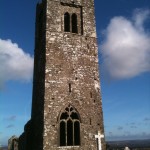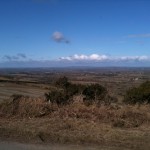Bike Touring In Ireland
Introduction
Ireland is a beautiful historic island and like anywhere else in the world it looks even better when seen from astride a motorcycle. There are miles of scenic routes and many places worth discovering and coming back to. With an under-populated landscape largely untouched by 20th century industrialisation and full of ancient ruins and prehistoric sites it‘s easy to get away from the rush of modern life and rediscover a sense of relaxed timelessness.
You’ll find a country well suited to motorcycling. A rapidly improving road network allows easy access to remote and isolated areas while still providing a worthwhile and memorable ride. There are numerous restaurants and pubs in which to spend the evenings and plenty options for accommodation ranging from campsites to luxury hotels.
General Information
English is the principal language, though many, especially in the West still speak Irish. Ireland is in the same time zone as the UK In Summer local time is GMT (or UTC) + 1 hour. Electricity is 220 volts, 50 Hertz. Tap water is drinkable everywhere.
Weather
Irish weather can be extremely changeable, one minute sunny, the next pouring rain, but there are usually no extremes of temperature or rainfall. When touring rarely will a week go by without having to resort to rain gear.
Documentation
EU citizens do not require Visas. All require passports or EU identity cards. You do not have to have your vehicle registration book, but should carry your insurance certificate and a full driving licence. Check that your insurance covers use in Ireland. EU residents should obtain Form E 111 from their health authority, this allows free medical attention if required.
Your Motorcycle
Your motorcycle must be in a roadworthy condition; all lights (including indicators if fitted) must work and the horn must function correctly. Tyres should have a minimum 1 mm tread depth, exhausts should not exceed 80 dB. Sidecars/combinations are legal. There is no trailer legislation as yet. Bikes with trailers rarely experience problems – though it is a legal grey area.
Rules of the Road
We drive on the left. Crash helmets are compulsory on motorcycles (but not on trikes! – though for the sake of a peaceful life, it is better to wear one than have to explain/defend your rights at the roadside to our fine Police force). Daytime lights are not compulsory but lights should be used in low visibility conditions during the day. See http://www.rulesoftheroad.ie/ for further information.
Drug & Alcohol Laws
It is illegal to be in charge of any kind of motor vehicle whilst under the influence of alcohol or drugs (including prescribed medicines) . The best advice is not to drink and ride.
Speed Limits
The national speed limit is 100Kmh on unrestricted national roads (“N” Roads), and 120Kmh on motorways. Built up areas in towns and cities have 60Kmh limits in some outer areas and more usually 50Kmh, though beware of some inner city limits of 30Kmh. Most regional roads have a limit of 80Kmh
Unwritten Rules of the Road
Irish roads tend not to be in as good a condition as elsewhere on mainland Europe, though there have been many recent improvements on most national primary routes. Potholes, especially near the verge are quite common, as are sudden changes in road surfaces and overuse of overbanding/road sealer.
In rural areas always be on the alert for straying animals and for farm machinery coming out of fields without warning. During the summer many roads are resurfaced with tar spraying and chippings (small stones) a process which often leaves dangerous patches of loose gravel which can be highly dangerous. “Expect the unexpected.”
In the Event of an Accident:
• Stop immediately
• Stay at the scene of the accident
• Supply your name and address (and that of the vehicle owner if different), vehicle registration and insurance details (company, number of the certificate. Irish registered cars – not bikes – should have this on a disc on the windscreen. If no one is able to take this information and if no member of the Garda Siochana (Irish police force) is present, or if anyone has been injured you must report the accident at the nearest Garda station.
• Obtain the same information from other parties involved in the accident.
Note the following:
• Name and address of any witnesses – independent witnesses are very important.
• Description of the injury to yourself and others.
• Description of damage to vehicles.
• Description of any damage to property or animals.
• The name, number and station of any police officer attending the scene of the accident.
• Date, time and location of the accident and details as to the circumstances.
• Photograph the accident scene and if possible mark on the roadway the position of the vehicles involved .
• Do not say anything which could be constructed as an admission of liability.
• Never give money to anyone involved in or witnessing an accident.
• Report any claim to your insurers.
Distance signs
Ireland is in a transitional stage which often causes confusion. On National Primary Roads and on Motorways the signs (green background on primary roads – blue on motorways) give distances in kilometres. Elsewhere signs with black lettering on white backgrounds can be in either miles or kilometres (older signs in miles, newer ones in kilometres).
Bike security and parking
When you leave your bike always lock it no matter where it is left. Make sure the steering lock is engaged. Try to lock the bike to a fixed object. Always remove the ignition key, even if left in a supervised garage. Never leave documents or valuable items on the bike. Avoid parking in isolated places at night, park in a well-lit area. Some multi-storey car parks will accept bikes, many do not. Look where others are parking their bikes; these places, though not ‘legal’ have been defined by custom and tradition (an Irish way of doing things!)
Breakdown and Repair
The Automobile Association (AA) provide a breakdown service for AA members (and to members of other motoring organisations with whom they have reciprocal arrangements). A list of motorcycle shops and recovery services which provide breakdown and recovery can be obtained from MAG Ireland or in an emergency from the police.You should prepare your bike properly before arriving in Ireland. Not all spare parts are immediately available even from main dealers, and you might have to wait several days for a part to arrive.
Public Telephones & Emergency Services
Public pay phones are almost non existent. GSM coverage is over 90%. For Emergency Services dial 999 or 112 on any telephone. All such calls are free. Remain calm, speak clearly, and answer the questions with as much detail as possible. Do not hang up until the operator tell you to do so.
Petrol
The minimum octane rating is 95, unleaded. There are a growing number of 24 hour stations in major cities and a few on primary routes, do not let your tank run too low especially in remote areas.
Food
There are a wide variety of fast-food outlets, cafes, restaurants and eating places throughout Ireland. The best Irish restaurants are not always the most expensive and not always in the cities or even towns. Perhaps the best value of all is the pub lunch, most often a traditional “meat and two veg” affair of generous proportions and priced from €8 to €12. The same quality and quantity at night is usually more expensive.
Drink
Pubs are usually open between 10am and 12pm. Last orders are usually around 11pm, depending on the season and location. You need to be at least 18 years of age to be served alcohol and children are not generally supposed to be in pubs after 9pm.
Accomodation
Ireland offers a variety of accomodation from campsites to top hotels. Compared to the rest of Europe the “Bed and Breakfast” (a room in a private house with a meal) is much more popular and is a good choice for touring motorcyclists.
National Holidays
Christmas Day, St. Stephen‘s Day (26 December), New Year‘s Day, St. Patrick‘s Day (17 March), Good Friday, Easter Monday, First Monday in June, First Monday in August, Last Monday in October.
Motorbike Rental
There are companies In Ireland that rent motorcycles, age and licence restrictions do apply and can easily be found online.
Found this information sheet useful? Not a MAG Ireland member? Why not show your support?
Donate to MAG Ireland –Become a MAG Ireland Member

